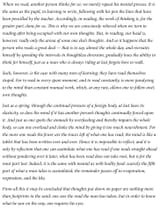Anonymous
7/23/2025, 7:20:01 PM No.24576225
I've just seen in an online lecture that post-great-schism there was a change in how reading happened and I'd like to know if there are some ways to "recover" the older one or if anyone here has any experience with this.
Supposedly, ancient practice of reading was more akin to a recitation - embodied, aloud, often communal, letting the text transform you as a sperson and engaging all your emotional faculties during the process. Post-schism there was an increasing tendency in the West to rely on Aristotelian approach of determining "substances" aka definitions and to relate them... reading became an act of absorbing propositions and re-arranging them in your head in ways that make sense and build models.
For a long time I did not "get" poetry, until I slowed down to like 20% of my reading speed and let each individual word trigger images and associations in me. Is this what is meant by embodied reading as opposed to absorbing propositions? Any advice? To this day when I read the Old Testament I "get" maybe 40% of it and I think it might be the Aristotelian approach blocking me.
Supposedly, ancient practice of reading was more akin to a recitation - embodied, aloud, often communal, letting the text transform you as a sperson and engaging all your emotional faculties during the process. Post-schism there was an increasing tendency in the West to rely on Aristotelian approach of determining "substances" aka definitions and to relate them... reading became an act of absorbing propositions and re-arranging them in your head in ways that make sense and build models.
For a long time I did not "get" poetry, until I slowed down to like 20% of my reading speed and let each individual word trigger images and associations in me. Is this what is meant by embodied reading as opposed to absorbing propositions? Any advice? To this day when I read the Old Testament I "get" maybe 40% of it and I think it might be the Aristotelian approach blocking me.
Replies:

